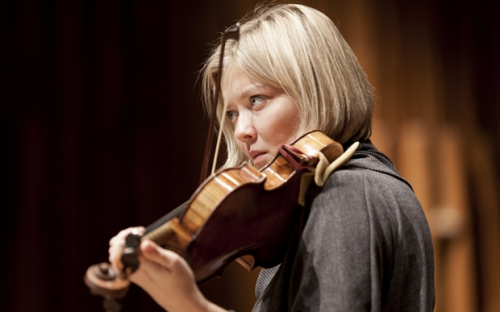 Switzerland Mendelssohn, Schubert: Tonhalle-Orchester Zürich, Alina Ibragimova (violin) / Christoph von Dohnányi (conductor). Tonhalle Maag, Zurich, 14.11.2019. (CCr)
Switzerland Mendelssohn, Schubert: Tonhalle-Orchester Zürich, Alina Ibragimova (violin) / Christoph von Dohnányi (conductor). Tonhalle Maag, Zurich, 14.11.2019. (CCr)

Mendelssohn – Violin Concerto in E minor Op.64
Schubert – Symphony No.8 in C major D944
Violinist Alina Ibragimova sprang in for an ailing Frank Zimmermann for two concerts in Zurich this week, joining the 90-year old legend Christoph von Dohnányi for a programme of purely early Romantic classics.
Ibragimova sounded as if she was the intended soloist for Mendelssohn’s Violin Concerto all along, racing gallantly and with full virtuoso pop through the flashiest bits of this beloved piece. She’s elsewhere a fine exponent of Baroque music and, with the Chiaroscuro Quartet she helped found, has shown a love for just about every facet of her instrument – she is just as at home in a lusty, gritty, hyper-deft cadenza as she is in a dolce melodic line of chamber music. Ibragimova did not nurse a private or intimate sound here – in keeping with her conductor’s matter-of-fact approach, with which she was in full concert – but did play in a way that revealed itself over the work’s thirty minutes to be increasingly coy and fleet and charmed.
Dohnányi led the Tonhalle Orchestra through an over-metered, under-textured reading of the Mendelssohn; only in the third movement did sectional contrasts begin to shape, the woodwinds shedding their initial stiffness. Dohnányi’s eyes were very much on the score, and his detached manner may account for some of the plainness of the playing, amidst so much splendour – much of it realised, some of it merely hinted potential. A conductor like Dohnányi has absolutely nothing left to prove at his age and stature, and one wonders why the everything-in-its-place reading.
Not so with the Schubert, his Great Symphony. The first movement was something of a revelation. Few orchestras could make Schubert’s final orchestral masterpiece sound so brisk and bright and jaunty without diminishing the monuments of the work. Here the steadiness of Dohnányi’s metered sound avoided boxy, tidy phrases and instead squeezed all of the grandeur into pulsatingly crisp lines. No slick elasticity of tempo is needed when a perfectly judged series of crescendos will do.
The work continued in this manner, grew bolder; the icy dance of the second movement was 0% maudlin, meaning that the moment of balmy cello rescue of nowhere-else-to-go eruptions was all the more stirring. Trombones were excellent. The third movement’s sour wit underpinned the continued stoic lushness of the work, and its ‘Trio’ contains what must be Schubert’s most sweetly wistful orchestral music. The Tonhalle Orchestra produced in the fourth movement a spirited tutti sound of great finesse.
It was enchanting to watch Dohnányi communicate his wishes to his players, seated and leaning back, arms kept close to his torso, a grin on his face. His little shoulder winks, his wide brow wrinkling, his sweet smile – all of it flashing messages of ‘isn’t this fun?’ ‘Wasn’t that better that way?’ ‘Not too loud now, dears’. In noteworthy contrast to the first half of the programme, he conducted the Schubert from memory, and the effect was audible to say the least. Like when you ask a harmless-looking grandfather a patronising question and get a wallop of an answer that puts you in your place, Dohnányi is a slightly unsober-seeming docent, of whom one would swear he might grow slack or unsteady, but for the unbroken expertness sussed out of the players under his baton.
Casey Creel
